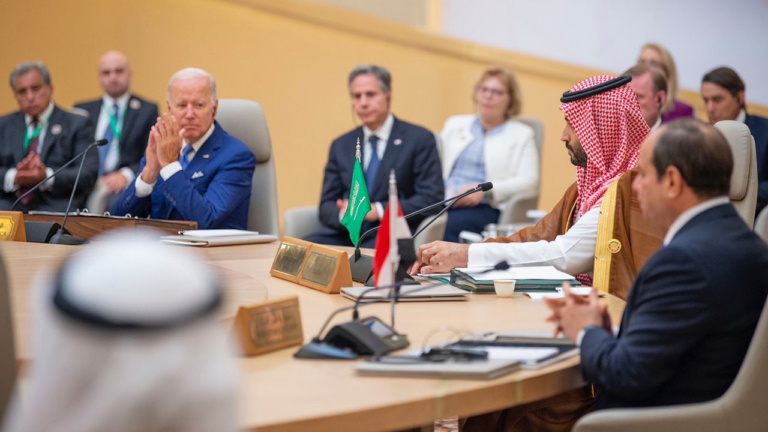
US President Joe Biden visited Israel, Palestine, and Saudi Arabia from July 13 to 16 to meet with various regional leaders. This was Biden’s first visit as president, and came at a time when the region is undergoing serious strategic, political, economic, and social changes. It also took place as Israel is seeking to consolidate its occupation of Palestinian land and intensify its system of apartheid against the Palestinian people. At the same time, several Gulf Cooperation Council (GCC) leaders have been expressing concern about a lack of what they call good old American commitment to their countries’ security. However, the trip also took place in the shadow of two significant developments, neither of which has been forgotten by observers and commentators in the United States. First, American public opinion over the last few years has seen a marked shift away from its traditional pro-Israel bias and toward increased fairness in looking at the issue of Palestinian rights. Second, political and popular opinion in the United States stands firmly opposed to giving Saudi Crown Prince Mohammed bin Salman a pass on his human rights abuses, his prosecution of the devastating war in Yemen, and his responsibility for the brutal killing and dismemberment of Washington Post columnist Jamal Khashoggi in 2018.
On this trip, President Biden met with Israel’s caretaker Prime Minister Yair Lapid and other Israeli politicians, Palestinian President Mahmoud Abbas and his lieutenants, Saudi King Salman bin Abdulaziz and Saudi Crown Prince Mohammed bin Salman, and with other Saudi officials. On July 16, the president attended a regional summit in Jeddah, Saudi Arabia with the leaders of all six GCC countries, as well as those of Egypt, Iraq, and Jordan. At the end of the summit, they issued a communiqué that addressed a series of ongoing challenges, including those related to Iran, Palestine, security, and energy.
Arab Center Washington DC (ACW) has asked a group of its fellows and affiliates to comment on the diverse aspects and significant consequences of President Biden’s trip to the Middle East. Their analyses are presented below. Please stay tuned as well for a full policy analysis paper on the GCC aspect of the trip by colleague Jonathan Hoffman.
Biden Leaves Palestine in Political Limbo
Khalil E. Jahshan, ACW Executive Director
For weeks prior to President Biden’s highly-touted trip to the Middle East, the administration left the impression with the public at home and abroad that the United States intended to restore lines of communication and diplomatic contacts with the Palestinians that had been unceremoniously severed by the Trump Administration. This symbolic step, along with subsequent statements by the president, raised hopes among some analysts that Biden would indeed use his July 15 visit to Israeli-occupied Palestine to transform his long-term commitment to the two-state solution into a political initiative to reinvigorate Israeli-Palestinian peace dialogue, which has been frozen since 2014. The president did indeed meet with Palestinian Authority President Mahmoud Abbas in Bethlehem and offered a number of symbolic economic and humanitarian initiatives to support the Palestinian people. However, their meeting failed to bridge the two leaders’ political differences since Biden neglected to deliver the main Palestinian demand, which is for a US-endorsed political horizon that leads out of the protracted Israeli occupation. This goal remains just as elusive as it was prior to Biden’s visit.
Frankly, the Palestinian people were wary of the Biden trip from the very beginning, and not as hopeful about his visit to Bethlehem as the White House or the Palestinian Authority would have liked. The people knew that their rather limited demand that the US Consulate in East Jerusalem and the PLO Mission in Washington be reopened would remain unfulfilled after Biden’s visit, which the president himself characterized as essentially focused on reaffirming the United States’ unshakable commitment to Israel’s national security. In the end, Biden did not do much to alter Palestinian public opinion, which expressed little hope for his visit. The president’s official statements in Israel and Palestine were quite contradictory and utterly void of any real attempt at bridging the gap between the parties. Indeed, the president’s words to both sides seemed addressed to two separate entities living on different planets, rather than two inextricably entangled governments separated by only a few miles.
Sadly, the visit, which ended “without any significant diplomatic breakthroughs,” caused more long-term damage to security and stability in Israel and Palestine than the Biden Administration seems willing to acknowledge. First, it was a missed opportunity for a US president who is publicly committed to a two-state solution to actively engage in furthering the cause of peace, rather than merely declaring that such an endeavor would be impractical at this time. Given his self-proclaimed extensive experience in foreign policy, one would have expected to see Biden present a vision for peace in the region, rather than a narrow focus on new military alliances, joint air defense systems, and a seemingly endless series of arms sales. Second, the president’s cringeworthy need to establish his Zionist bona fides and his careless, ill-timed remarks in Israel spoke volumes about his personal bias when it comes to Palestine, thus diminishing his credibility and effectively disqualifying him and his administration from playing a constructive role in potential Israeli-Palestinian negotiations during the remainder of his term in office.
Third, either wittingly or unwittingly, President Biden fell into the trap set for him by Israel and certain Arab allies to join the “Middle East without Palestine” club that is currently dominating the region. By swallowing Trump’s shortsighted Abraham Accords hook, line, and sinker, the president has given his stamp of approval to the marginalization of the issue of Palestine, uncoupling it from broader relations with the Arab world, and even seeking to uncouple Israel from the Palestinians, who remain under an oppressive and protracted Israeli military occupation that has lasted fifty-five years. Such an act is not, as President Biden claimed in the Jerusalem Joint Declaration that he cosigned with Israeli caretaker Prime Minister Lapid, “Tikkun Olam,” the Hebrew term that means “mending the world,” and that is often used in the context of working for social justice. Looking back at Biden’s recent trip, it is abundantly clear that no such justice is there to be found.
Biden’s Visit Exposed Jordan’s Irrelevance
Imad K. Harb, ACW Director of Research and Analysis
President Biden’s trip to the Middle East did not include a stop in Jordan, despite his close relationship with the country and its current leader King Abdullah II, a relationship that was forged over the many decades of Biden’s life in politics. Perhaps the president was too concerned with affirming his strategic, undying commitment to Zionism and to Israel’s security, and with reclaiming at least a small amount of American influence in the Arabian Gulf to pay attention to the needs of a friend. It is also possible that Biden and his loyal advisors have finally disabused themselves of the notion that King Abdullah holds the keys to peace in the Middle East, or that he can be a helpful interlocutor in US-Gulf relations.
But regardless, King Abdullah attended the Jeddah Summit, participated in its discussions about Iran, security, and energy, and, to his credit, was one of the few leaders present who reminded the American president of the need to address the matter of Palestinian rights. Given that Jordan has long been a reliable US partner in the Middle East, the king must have felt that his presence at the table was essential for relaunching US relations with such powerhouses as Saudi Arabia and the UAE. Nevertheless, Jordan’s economic troubles, its lessened influence over Israeli actions in the occupied Palestinian territories, and its decreased ability to impact events in Syria, all limited Abdullah’s ambitions. In fact, it is doubtful that the post-summit period will increase Jordan’s clout in resolving the Palestinian-Israeli conflict or in shrinking the widening chasm in US-Gulf relations. Because it is heavily reliant on outside assistance (specifically from the United States and the Gulf), Jordan is more likely to continue to hobble on the margins of regional strategic developments concerning Israel/Palestine, Syria, and escalating Arab-Iran antagonism. This is perhaps why Jordan is seeking closer economic and security relations with Iraq and Egypt—both of which also participated in the Jeddah Summit—in order to reserve for itself at least a modicum of regional influence and a card to be played in the region’s ever-shifting competition for relevance.
The Jeddah Summit: What Was in It for Iraq?
Rend Al-Rahim, Former Iraqi Ambassador to the United States
Before Iraqi Prime Minister Mustafa al-Kadhimi announced that he would attend the Jeddah Summit, Kata’ib Hezbollah, a Shia militia in Iraq, issued a statement indirectly attacking the summit and accusing the prime minister of “treachery” and of being a “foreign agent” driving Iraq to normalize with Israel. But despite such attacks, al-Kadhimi still went to Jeddah. Domestically, this was a bold declaration that Iraq’s foreign policy will not be held hostage, or be dictated by the agenda of Iran-friendly Iraqi militias. From a strategic perspective, his presence at the summit with leaders of the GCC, Jordan, and Egypt, alongside President Biden, was a public affirmation of Iraq’s integration into the heart of the Arab world. Bilateral and trilateral meetings covering economic and security issues between senior Iraqi leaders and their counterparts in Egypt, Jordan, Saudi Arabia, and the UAE have already been occurring for a few years now. The Jeddah Summit both confirmed and reinforced Iraq’s bonds with its Arab neighbors, while also demonstrating the country’s status as a regional actor. Now that Iraq is well-embedded in its Arab neighborhood, it will be important for its Arab friends to do their part in expanding and strengthening ties with a country that has been treated as an outcast for nearly two decades. Doing so is in everyone’s mutual interest.
The President Squandered Democratic Fortunes in the Middle East
Laurie King, Professor of Anthropology, Georgetown University, and ACW Board Member
President Biden’s approach to foreign affairs is particularly exasperating for the millions of Americans who voted for him in 2020. His recent trip to the Middle East left many Democrats—and especially young ones—scratching their heads. The fact that Biden declared himself a Zionist and a true friend of Israel at a time when the right-wing, Trump-loving Likud Party is firmly ensconced in power—and has been justifiably accused of the crime of apartheid by the United Nations and diverse human rights organizations—will not sit well with the increasingly progressive youth membership of the Democratic Party, many of whom are American Jews who are thoroughly fed up with Zionism.
Even worse than Biden’s unflinching support of Israel, however, was his visit to Saudi Arabia and his display of obsequiousness before Jamal Khashoggi’s murderer, Mohammed bin Salman. And for what did the president bow and stoop? More and cheaper oil, of course, even as climate change—a result of fossil fuel excesses—rapidly destroys the planet. Combatting climate change was a key pillar of Biden’s campaign platform, one that he gave up all too easily. And adding insult to injury, both Israel and Saudi Arabia are counting on the return of former President Donald Trump, or someone else like him, making Biden’s actions all the more embarrassing. Indeed, the Israeli and Saudi political elite were laughing behind the president’s back during his entire visit. Meanwhile, on the home front, Biden’s Middle East trip may have sealed his fate in the 2024 elections. But it need not doom the Democratic Party as a whole. The party’s gerontocracy desperately needs to step aside as soon as possible and let younger people with a firmer grasp of the challenges we are facing take the lead.




